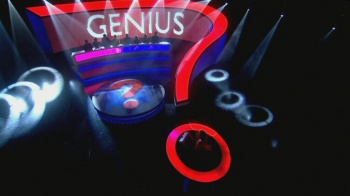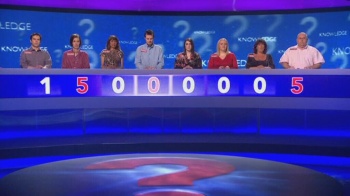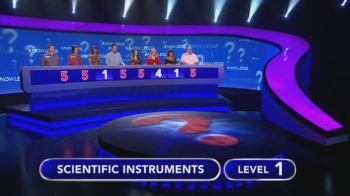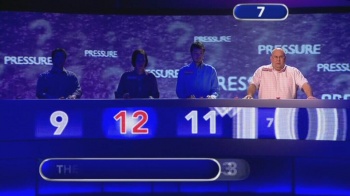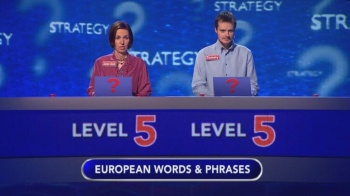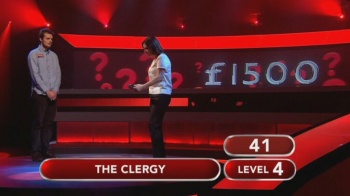Weaver's Week 2009-04-12
Last week | Weaver's Week Index | Next week
The death was announced this week of Lennie Bennett. We'll remember him as the host of Punchlines and Lucky Ladders.
Contents |
A Question of Genius
BBC Scotland for BBC2 and BBC-HD, 4.30 weekdays, 16 March – 17 April
What does the viewing public look for in a programme shot in this new-fangled high-definition technology? At this early stage, we reckon that every show shot in high-definition should actually benefit from being in high-definition. Sports, for instance, benefit from actually being able to see the ball rather than having a murky white shape in the middle distance. Performance shows are enhanced by the extra sound channels, and nature documentaries look splendid in this newer format.
Some game shows are right for high-definition. The Lloyd-Webber casting shows since How Do You Solve a Problem Like Maria? used the enhanced sound, Raven just about qualifies as a sports show if one squints enough, and Kerwhizz benefits from the high-quality animations. At this early stage, not every studio in the UK is capable of making these shows. We reckon that they should be used for programmes where high-definition will make a difference. To use scarce facilities on shows that almost work in sound alone, and certainly gain little from being seen in black-and-white, feels wrong.
Our host for this quiz is Kirsty Wark. She's best-known for quoting lyrics from pop songs on Newsnight, but has a little experience in the shows we call game. She's hosted the most recent series of The Book Quiz, and managed to turn it from an affable little entertainment with David Baddiel into an impenetrably dull wall of high literature.
Ten players have come to the studio, and they've been asked some questions to determine which of them go through to the main game. This preliminary round isn't televised, and there's enough wasted time in this format to make that an unreasonable omission – it need not have detained us for longer than the opening round of Number One.
Anyway, eight players qualify for the First Round Proper. They're asked a series of questions on the buzzer. Whoever answers the buzzer question correctly will be asked a question on a similar subject, and has the opportunity to select the difficulty of that question. The difficulty ranges from one to five points, though most players select between one and three. Five points are required to progress, and the first six players to do so remain in the game.
Any resemblance between this round and the Neuf Points Gagnant round on Going for Gold is, of course, a coincidence. All the scoring in this games comes from the bonus questions – the starters are not rewarded in any way. Any resemblance between this scoring system and one used in the very early years of University Challenge is, of course, a coincidence. It might be difficult for listeners on the wireless to keep tabs on eight scores, but there's little here that absolutely requires visuals, and nothing that really needs high-definition.
Before round two, there's a short preview of what the winner could win. It's not one of the five films they shot about the Seoul Olympics, but the subjects selected by the six people still in the game.
Round two features more buzzer questions. The first person to answer the question chooses the level of difficulty for the follow-up question, and their prospective opponent. Ten points are required to progress from this round. As in the first round, an incorrect buzz on a starter question leaves that person wallied out of the subsequent question.
It seems to take approximately one forever for this round to reach a conclusion: any comparison with For the Rest of Your Life is, of course, a coincidence. Perhaps the producers were alert to this: after about a week, the barrier was lowered to five points, meaning the round only lasted a very very long time.
In round three, players have a 60-second drill. They're given a subject, and select the level of difficulty they'll face. If the player in control fails to answer correctly, it can be offered to one of their opponents, so long as they buzz before the contestant answers. The top two scores progress. The round is done in four minutes, and there's a clear sense that the show is actually moving towards a conclusion.
Two players survive for the head-to-head final, round four. They're each given the category, then enter secret bids for difficulty. The higher bid gets the question, but an error allows their opponent to hear a question at their selected level. The first player to 15 points wins, unless it's after the first week, in which case ten points will suffice.
There's now just one player left, we know the champion, so now they get to answer their titular question of genius and collect their dosh. Right? Er, wrong. There's a rather pointless Round Five next: the champion has 90 seconds to build cash for their prize. The champ selects their category from a choice of two, but the level increases with each correct answer. The category they've reached determines the prize they'll go for in the next round.
Round Six is one very tough question on a nominated subject, for the prize accumulated in round five. Any chance of concentrating is ruined by Kirsty repeating the question and asking what the contestant is thinking about. Should the contestant give the right answer, they win the prize; if they're wrong, they don't, and they won't return on the next day's show. However, the contestant can take three options for their question, but this will cost them half their prize money.
There is a reason for the otherwise-pointless Round Five: the ten best contestants who correctly answer their question are invited back for an end-of-series playoff for higher stakes.
As a format for a game show, this isn't actually bad. Like most of the 45-minute shows we've seen this decade, it's the wrong length. We reckon it's contracted from a full-hour format, but this feeling lessened after the first week. There are familiar bits, and the returning questions concept reminds us further of Going For Gold.
However, many of the details don't really work. Kirsty Wark was the host, and she lacks any particular sense of warmth and charm. She's not grilling quotidian politicians on Newsnight any more. There were also some terrible verbal slips from time to time – the cyclist was pronounced as "Greg Lemonned" at one point, the sort of thing that shouldn't happen to a prepared host.
We're not fans of the off-the-ear microphones worn by the contestants – there are reasons why lapel mikes are standard issue. The set is tremendously clichéd: it's got a black backdrop, huge numbers of spotlights, and LED screens that look horrible when in a close shot of the contestants. When seen from afar, the score display is clear, and the buzzer effect – a light flashing out from their score – is attractive. The design doesn't need high-definition, and we don't think the show particularly benefits from high-definition.
The show tries to make its own catchphrases, and fails badly. Kirsty says, "You could be today's genius" whenever someone progresses to the next round, but it lacks sincerity. Calling each round "A question of ..." something-or-other is open to ridicule: this review is adopting the Richard Hammond policy of calling the first round, the first round. Other reviews are less charitable.
Let's be fair to the devisors, there is a good quiz in here, somewhere. Many of the changes made during the weeks of transmission were for the better, and we do applaud everyone's ability to tinker with the most glaring errors. There's so much wrong with the details of the execution that we doubt it'll get a second series, and that would be unfortunate.
Mastermind
Heat 24/24
Er, does this mean we're only eight more programmes from finding out the winner? Too right, and maybe – maybe! – we will know the winner of Mastermind 2008 before we find out the winner of Scrapheap Challenge 2008.
Christopher Argyle will discuss the Battles of Coronel and the Falklands of 1914. The battle is not to be confused with a subsequent series of battles for the Falklands. Coronel is a city on the coast of Chile, and the Falklands can be found under a crumb. The battles were victories for Germany and the Allies, in that order, and the round is a clear victory, ending on 14 (0).
Richard Smyth has taken a massive subject, British Birds. Ouch! Actually, there seems to be method in the contender's madness: the subject is so broad that it's not being tested in tremendous depth. Either that, or he's making the complex seem simple, ending on 17 (0).
Susan Walker has been studying the Life and Work of Barbara Hepworth, a painter and sculptor active during the mid-20th century. It's a taxing round, and ends with another very good score, 13 (0).
And finally! The last of the million contestants is Steve Howe, and he has the Anglo-Saxon Kings 871-1016. These were kings of England as it was defined at the time: Wessex, Kent, Anglia, Northumbria, Mercia, and whatever they called the area that would go on to become Lancashire. The contender probably knows, he certainly knows most other things, ending on 15 (0).
Susan Walker gives a strong defence of the quality of Barbara Hepworth's work, and points out that it's just that bit better because she's a woman. Her general knowledge round features the first pass of the night, ending on 20 (1).
Why were the Germans and British fighting so hard off the coast of South America, asks our host. There were major trade routes from Uruguay to supply Spain, which was seen as a potential ally for both sides. Mr. Argyle is also asked who is the current leader of the Liberal Democrats. It's not part of the quiz, just that the host has forgotten. The contender's score is 23 (1).
Mr. Howe's period runs from Alfred the Great to Edmund Ironside. In addition to his exploits in the kitchen, Alfred the Great created England as we know it, and the contender points out it's another fine piece of German engineering. Back at the quiz, "dwarf planets" get an appearance, and the final score is 26 (4).
Ten points will assure victory for Mr. Smyth, and we've seen people fall at that demand so often in the past. He says he's a birdwatcher, but not a twitcher. There is a difference, birdwatchers don't treat it as a competition. This is a competition, and the contender goes vam-vam-vam through the first few questions, but then begins to run into more difficult territory. He's right to guess, because there are a lot of passes to deal with, and pulls a couple of good answers out of somewhere. The winning score is 29 (0).
This Week And Next
We were intrigued to hear the contestants on this week's edition of Counterpoint were offered a set of questions on Humphrey Lyttelton. Lest we forget, he was as much jazz man as man-in-Wonderland. The questions were left on the shelf, and they'll be offered again until someone bites.
The Radio Academy announced the nominees for its annual awards this week. Most of the categories pass us by, but one category is clearly within our purview:
The Competition Award
- Adam and Joe – Video Wars – BBC Audio & Music for 6 Music
- Facebuck$ – Galaxy Network Imaging for Galaxy (Manchester, Birmingham, Yorkshire & North East)
- Heart's Tankety Tank – Heart (West Midlands)
- Radio City Makes Your Day – Radio City
- Win Your Wedding – CFM
The BAFTA Television Craft awards have also released their nominations. Charlie Brooker is nominated in the Breakthrough Talent category for his Big Brother spin-off Dead Set, and the interactive team – Will Clark, Chris Hassell, Stuart Holton – are nominated for the website. So far as game shows are concerned, that's your lot.
This year's Eurospat is about the rather small country of Moldova, nestled between Romania and Russia and previously best-known for their drum-bashing granny. To cut a very long story short, there were elections in Moldova last weekend, and there are disputes about who won. Russia is backing the governing communist party, Romania is backing the separatist opposition, both countries are shouting at the top of their barks, and it wouldn't surprise us if this were reflected in that traditional barometer of popular opinion, voting at the Eurovision Song Contest. We'd sooner a bit of conflict in the Moscow arena than on the fields of the continent, thank you very much.
Ratings for the week to 29 March show a great big hole where Dancing on Ice once stood. The Apprentice takes two of the top three positions: 8.7m saw the show on BBC1, and 3.2m an interview with the winner on BBC2. One Versus One Hundred was in the middle, 6.15m there. Though ITV did show a game show in peak time, The Colour of Money failed to make the weekly top thirty, making it less successful than Bargain Hunt Famous Finds (1.55m on BBC2). Come Dine With Me had another mightily successful Sunday on More4, with 1.03m tuning in for the week's denouement. QI on Dave was seen by half-a-million, and wound up ahead of Pop Idleus on ITV2. Living did well with America's Next Top Model, 410,000 played spot the stick.
It's finals week on S4C, where Pen Campau (Monday, 6.30) and Cwis Meddiant (Wednesday, 8.25) both reach their conclusions. ITV is pushing the boat out this week, with a new run of Hell's Kitchen from 9pm Monday, but not Tuesday, then every weeknight thereafter.
To have Weaver's Week emailed to you on publication day, receive our exclusive TV roundup of the game shows in the week ahead, and chat to other ukgameshows.com readers sign up to our Yahoo! Group.


